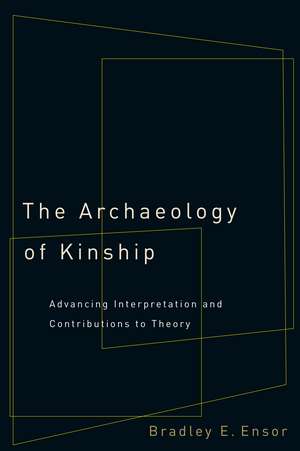The Archaeology of Kinship: Advancing Interpretation and Contributions to Theory
Autor Bradley E. Ensoren Limba Engleză Hardback – 5 dec 2013
Archaeology has been subjected to a wide range of misunderstandings of kinship theory and many of its central concepts. Demonstrating that kinship is the foundation for past societies’ social organization, particularly in non-state societies, Bradley E. Ensor offers a lucid presentation of kinship principles and theories accessible to a broad audience. He provides not only descriptions of what the principles entail but also an understanding of their relevance to past and present topics of interest to archaeologists. His overall goal is always clear: to illustrate how kinship analysis can advance archaeological interpretation and how archaeology can advance kinship theory.
The Archaeology of Kinship supports Ensor’s objectives: to demonstrate the relevance of kinship to major archaeological questions, to describe archaeological methods for kinship analysis independent of ethnological interpretation, to illustrate the use of those techniques with a case study, and to provide specific examples of how diachronic analyses address broader theory. As Ensor shows, archaeological diachronic analyses of kinship are independently possible, necessary, and capable of providing new insights into past cultures and broader anthropological theory. Although it is an old subject in anthropology, The Archaeology of Kinship can offer new and exciting frontiers for inquiry.
Kinship research in general—and prehistoric kinship in particular—is rapidly reemerging as a topical subject in anthropology. This book is a timely archaeological contribution to that growing literature otherwise dominated by ethnology.
The Archaeology of Kinship supports Ensor’s objectives: to demonstrate the relevance of kinship to major archaeological questions, to describe archaeological methods for kinship analysis independent of ethnological interpretation, to illustrate the use of those techniques with a case study, and to provide specific examples of how diachronic analyses address broader theory. As Ensor shows, archaeological diachronic analyses of kinship are independently possible, necessary, and capable of providing new insights into past cultures and broader anthropological theory. Although it is an old subject in anthropology, The Archaeology of Kinship can offer new and exciting frontiers for inquiry.
Kinship research in general—and prehistoric kinship in particular—is rapidly reemerging as a topical subject in anthropology. This book is a timely archaeological contribution to that growing literature otherwise dominated by ethnology.
Preț: 414.80 lei
Preț vechi: 562.95 lei
-26% Nou
Puncte Express: 622
Preț estimativ în valută:
79.38€ • 86.20$ • 66.68£
79.38€ • 86.20$ • 66.68£
Carte indisponibilă temporar
Doresc să fiu notificat când acest titlu va fi disponibil:
Se trimite...
Preluare comenzi: 021 569.72.76
Specificații
ISBN-13: 9780816530540
ISBN-10: 0816530548
Pagini: 368
Ilustrații: 34 lines, 3 tables
Dimensiuni: 152 x 229 x 32 mm
Greutate: 0.63 kg
Ediția:First Edition
Editura: University of Arizona Press
Colecția University of Arizona Press
ISBN-10: 0816530548
Pagini: 368
Ilustrații: 34 lines, 3 tables
Dimensiuni: 152 x 229 x 32 mm
Greutate: 0.63 kg
Ediția:First Edition
Editura: University of Arizona Press
Colecția University of Arizona Press
Notă biografică
Bradley E. Ensor is a professor in the Department of Sociology, Anthropology, and Criminology at Eastern Michigan University.
Recenzii
"This book fills the intellectual gap between contemporary archaeology and cutting edge understandings of kinship emerging in current ethnographic research."—Archaeological Review from Cambridge
“Ensor’s book is a tour de force that is certain to deeply impact the practice of archaeology.”—Peter N. Peregrine, co-author of Anthropology
“Ensor dares go where few archaeologists have gone for decades when he identifies the study of kinship as a major goal of archaeological research. This is not the archaeological study of kinship of the 1960s and 1970s but rather an approach fully grounded in current post-processual theory.”—David E. Doyel, Arizona Archaeological Society
“Ensor’s book is a tour de force that is certain to deeply impact the practice of archaeology.”—Peter N. Peregrine, co-author of Anthropology
“Ensor dares go where few archaeologists have gone for decades when he identifies the study of kinship as a major goal of archaeological research. This is not the archaeological study of kinship of the 1960s and 1970s but rather an approach fully grounded in current post-processual theory.”—David E. Doyel, Arizona Archaeological Society
Descriere
This book explains how kinship is relevant to contemporary archaeological theory, detailing methods appropriate for archaeological analysis, and provides long-overdue solutions to problems plaguing ethnological hypotheses on the origins and contexts of kinship behaviors.
